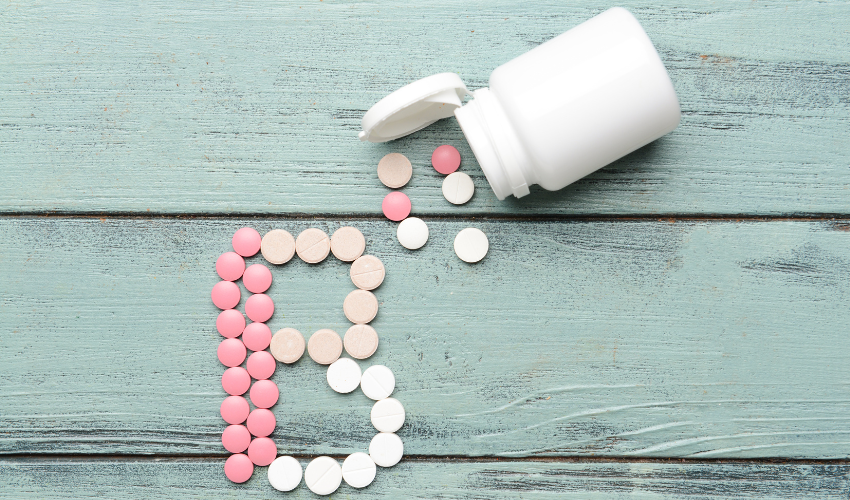Vitamin B is a group of essential vitamins that play a crucial role in maintaining good health. They are involved in numerous bodily functions such as energy production, metabolism, brain function, and the formation of red blood cells. In this article, we will explore the many benefits of consuming vitamin B rich foods.
What Foods Are Rich In Vitamin B?

Vitamin B is found in a variety of foods, including:
- Leafy greens such as spinach and kale
- Whole grains like quinoa, brown rice, and oats
- Nuts and seeds, including almonds, sunflower seeds, and flaxseeds
- Legumes such as lentils, chickpeas, and beans
- Dairy products, including milk and yogurt
- Meat, poultry, and fish, including salmon, tuna, and chicken
Benefits of Consuming Vitamin B
Consuming foods rich in vitamin B can offer several health benefits, including:
Boosts Energy: Vitamin B plays a critical role in converting food into energy, making it a vital nutrient for maintaining energy levels.
Improves Brain Function: Vitamin B is involved in the production of neurotransmitters, which are essential for cognitive function and mood regulation.
Supports a Healthy Pregnancy: Vitamin B9 (folate) is crucial for fetal development and can help prevent birth defects.
Promotes Heart Health: Vitamin B6, B9, and B12 play a vital role in reducing homocysteine levels, which can lower the risk of heart disease.
Reduces Inflammation: Vitamin B6 has anti-inflammatory properties that can help reduce inflammation in the body.
Types of Vitamin B and their Functions
- Thiamine (B1): Converts food into energy and supports nerve and muscle function.
- Riboflavin (B2): Helps convert food into energy and supports healthy skin, eyes, and nervous system.
- Niacin (B3): Helps lower cholesterol levels, supports healthy skin, and improves brain function.
- Pantothenic Acid (B5): Helps convert food into energy and supports healthy skin, hair, and eyes.
- Pyridoxine (B6): Supports brain function and mood regulation, helps produce red blood cells, and supports healthy immune function.
- Biotin (B7): Helps metabolize fats, carbohydrates, and proteins and supports healthy skin, hair, and nails.
- Folate (B9): Helps produce red blood cells and DNA and reduces the risk of birth defects.
- Cobalamin (B12): Helps produce red blood cells and supports brain function and nerve health.
Recommended Daily Intake of Vitamin B
The recommended daily intake of vitamin B varies depending on the specific vitamin, age, and gender. Here are the recommended daily intake levels for each vitamin:
- Vitamin B1 (Thiamine): 1.2 mg for men and 1.1 mg for women
- Vitamin B2 (Riboflavin): 1.3 mg for men and 1.1 mg for women
- Vitamin B3 (Niacin): 16 mg for men and 14 mg for women
- Vitamin B5 (Pantothenic Acid): 5 mg for men and women
- Vitamin B6 (Pyridoxine): 1.3 mg for men and women
- Vitamin B7 (Biotin): 30 mcg for men and women
- Vitamin B9 (Folate): 400 mcg for men and women
- Vitamin B12 (Cobalamin): 2.4 mcg for men and women
How to Incorporate Vitamin B into Your Diet
- Choose whole grain options, such as brown rice and whole wheat bread.
- Add leafy green vegetables to salads or smoothies.
- Incorporate legumes into soups, stews, and salads.
- Snack on nuts and seeds throughout the day.
- Choose lean meats and fish for protein sources.
- Add dairy products, such as milk and yogurt, to smoothies and recipes.
- Use eggs in breakfast dishes and baked goods.
- Incorporate fruits and vegetables into meals and snacks.
Vitamin B Supplements: Are They Necessary?
Supplements can be useful for individuals with deficiencies or absorption issues. Consult with a healthcare professional before taking Vitamin B supplements. Supplements should not replace a healthy and balanced diet.
FAQs
What are the symptoms of Vitamin B deficiency?
Symptoms of Vitamin B deficiency include fatigue, weakness, irritability, poor memory, digestive issues, anemia, and neurological problems.
Can consuming too much Vitamin B be harmful?
Consuming excessive amounts of Vitamin B is generally not harmful, as the body excretes excess amounts through urine. However, taking high doses of certain types of Vitamin B, such as B6 and B12, may cause side effects like nerve damage and skin rashes.
Can Vitamin B supplements improve energy levels?
Vitamin B supplements can help improve energy levels in individuals with deficiencies, but they are not a replacement for a healthy and balanced diet.
Are Vitamin B rich foods beneficial for skin health?
Yes, consuming Vitamin B rich foods can improve skin health by promoting collagen production and reducing inflammation.
Can Vitamin B help reduce the risk of birth defects?
Yes, consuming adequate amounts of Vitamin B9 (folate) before and during pregnancy can help reduce the risk of birth defects.
Conclusion
Incorporating Vitamin B rich foods into your diet can provide numerous benefits for your overall health and well-being. From boosting energy levels to improving brain function and supporting healthy skin, hair, and nails, Vitamin B is a crucial nutrient that should not be overlooked. Whether you choose to consume Vitamin B through whole foods or supplements, it is important to consult with a healthcare professional and maintain a balanced diet for optimal health. So, start incorporating Vitamin B rich foods into your meals today and experience the benefits for yourself!























